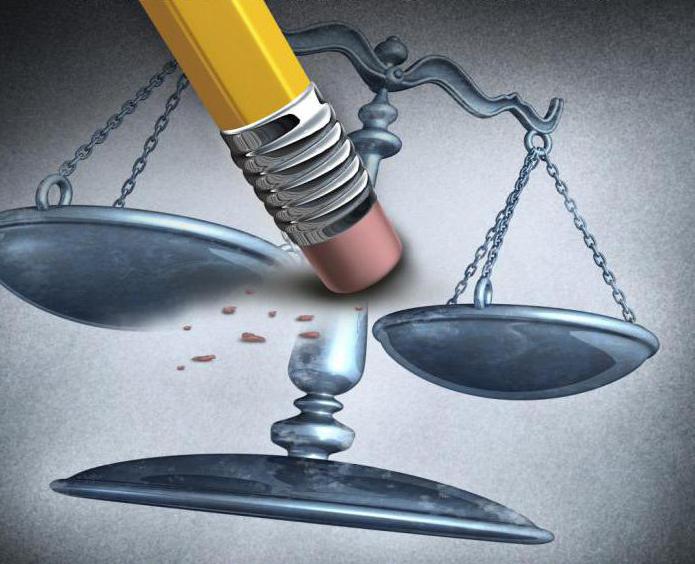After entering a new stage of its development in the early 90s of the last century, Russia faced a number of problems. One of them was the system of crimes that make up bribery. Their general characteristic, which will be discussed in this article, suggests that such a phenomenon became possible due to a number of unsuccessful reforms that led to the stratification of the population and the emergence of completely different ideals.
 Bribery is a crime that can destroy the economic foundation of the state. After all, it undermines its international authority and creates an atmosphere of lawlessness and lawlessness in the country.
Bribery is a crime that can destroy the economic foundation of the state. After all, it undermines its international authority and creates an atmosphere of lawlessness and lawlessness in the country.
Spread
The characterization of bribery in Russia today confirms that this negative phenomenon has reached considerable size and has penetrated almost all spheres of public life. The fight against this type of crime is becoming one of the main activities of the state, which proclaimed the equality and justice of its citizens.
What are the reasons for such a rapid increase in bribery? They are explained by powerlessness, and sometimes simply by the inaction of law enforcement agencies, which are called upon to combat this type of crime. After all, it is known that the most significant factor that can prevent the commission of illegal actions is the inevitability of their punishment. And in this case, we can say that in most cases there is no punishment at all. That is why thousands of officials become bribe takers. After all, they are confident that responsibility for these acts will never come.
Definition of a concept
What is the general characteristic of bribery expressed? This phenomenon is nothing more than the receipt by an official, either in person or through an intermediary, of securities, money, or other property for certain acts or omissions committed in favor of a bribe giver or a person authorized by him.
Moreover, such actions or omissions should be included in the list of official duties of the ransomware. The same in terms of responsibility is the crime of giving wealth. Such a reward can take any form and be called upon to resolve a particular issue.
Corpus delicti
The forensic characterization of bribery clearly indicates the dualism of this phenomenon. On the one hand, the receipt of material or financial assets is punishable, and on the other, their transfer.

Thus, the general criminological characteristic of bribery is the presence of two elements of a crime. Consequently, liability for unlawful acts occurs on both sides of this illegal transaction. This fact should be taken into account during the investigation. After all, both parties have an interest in ensuring that their acts do not become known to others and law enforcement agencies. That is why both the bribe taker and the bribe giver make every effort to disguise their crime.
Why give illegal rewards?
Law enforcement agencies rightly believe that only a small part of crimes related to bribery are detected in Russia. And this is due to a number of different reasons.
The forensic characterization of bribery and other official crimes confirms their high prevalence in all areas of our society.So, illegal rewards give for the opportunity to go to a prestigious university, get housing, get a job. Corruption in other areas has also been greatly developed. This is the solution to the issue of unlawful exemption from administrative liability, registration, etc.
The forensic characteristics of bribery indicate that officials receive the largest amount of illicit enrichment for land allotments, drawing up contracts that are beneficial to the rewarding party, obtaining loans, for facilitating the privatization of national enterprises, for favor during criminal and civil cases, etc. d.
Ways of illegally obtaining valuables
The forensic characterization of bribery and other official crimes considers this act from various perspectives. One of them is a way of committing illegal actions. From this point of view, bribery is divided into several types. Such a classification depends on the features during which the values were transmitted, the presence of pressure on the bribe-giver, the group or sole nature of the acts committed, etc.
 Thus, the criminal law characterization of bribery indicates the existence of such types of crimes such as:
Thus, the criminal law characterization of bribery indicates the existence of such types of crimes such as:
- with intermediaries and without intermediaries;
- with extortion and without extortion;
- for committing illegal or legal acts or omissions in favor of a bribe giver;
- committed by a group of persons having a preliminary conspiracy.
When considering the forensic characteristics of bribery, any of the above methods, if necessary, should be detailed. Such fragmentation takes into account the types of mediation, the particularities of transferring a bribe and its subject, the peculiarities of extortion, the scope of the bribe-taker, the degree of executive organization of the illegal act and the peculiarities of preliminary conspiracy.
The criminal characteristic of bribery is given only with a detailed clarification of the particular circumstances of the commission of this corruption crime. This may be mismanagement or lack of control, red tape or bureaucracy, the presence of the bail of officials, etc.
Characteristics of the personality of bribe takers
What characterization can be given to those who, by all possible illegal means, seek enrichment? These are individuals with a penchant for money-grubbing and self-interest, striving to improve their financial situation by any means and dreaming of easy money. In addition, they are irresponsible and have legal nihilism.
In connection with the expansion of those areas of society in which bribery has penetrated, such crimes are committed by various persons. These may be small municipal officials and those who hold posts at the federal level. The list of such persons sometimes starts with a large oligarch and ends with a poor old woman, transferring her savings to someone who intentionally impedes the exercise of her constitutional freedoms and rights.
Crime Detection
It is not easy to identify the fact of bribery, because this crime has an inherent mechanism of trace formation.

It is worth pointing out that the direct process of transferring money, as a rule, is carried out in the absence of eyewitnesses. In addition, both parties to the crime are interested in their actions. They do not want to bear responsibility and take all possible measures to conceal their activities. Based on the fact that criminal responsibility is applied to all participants in the crime, each of them evades giving true testimonies and does not give out his accomplices.
In addition to the foregoing, bribes are received for completely legitimate acts, and it is very difficult to prove an illegal act.In such cases, only indirect evidence can be found in the documents by the investigator, revealing the mercenary interest of the official in making this or that decision.
How to solve a crime?
Despite the complexity of the investigative measures, material traces indicating giving or receiving a bribe are always there. These are accounts opened in various banks, savings books, mail orders, management documents indicating the adoption of a decision, accounting materials in the form of accounts from hotels, travel certificates confirming the official’s stay in a certain place.
Sometimes very important information is provided by family members, random witnesses and colleagues of the bribe giver, who saw him with the bribe taker, and also heard their conversations, etc.
Corruption
Bribery is one of the components of a very large-scale phenomenon that takes place in our country. We are talking about corruption, which is also a criminal social phenomenon and is also characterized by constant or one-time facts of illegal sale by officials of their official duties.

Such crimes are committed by persons located at various levels of government institutions, in order to obtain wealth, goods, services and benefits. Such officials connivate in the service, act or are inactive, patronize, are a cover for criminal structures, and also perform other actions in favor of the party giving the bribe.
Corruption is a criminal phenomenon that constitutes a public danger. It leads to the decomposition of the apparatus of power, discrediting and undermining its authority. In addition, corruption has a negative impact on many other aspects of the state’s life, including banking, financial, economic, social, political and law enforcement.
Corruption in modern Russia
Such a negative phenomenon acts as a large-scale bribery. It manifests itself in the systematic bribery of officials holding positions in the executive, legislative, and judicial branches of government. Corruption entails the adoption by officials of decisions that violate the law or unwritten rules of society.
Today, corrupt bodies are a special system that includes dozens of participants. In this case, the process of transferring a bribe is carried out according to a previously outlined plan, which allows to ensure maximum secrecy of all illegal actions.
 The existence of such illegal schemes undermines the economic foundations of our state, its integrity and stability. This cannot but concern law enforcement agencies, whose task is to combat such a negative phenomenon.
The existence of such illegal schemes undermines the economic foundations of our state, its integrity and stability. This cannot but concern law enforcement agencies, whose task is to combat such a negative phenomenon.
Mediation
In a general sense, this concept means providing assistance or assistance in resolving cases. In other words, the word "mediation" does not carry any negative connotations. However, when the characteristic of bribery is considered, the context of this concept changes radically. After all, a person who provides assistance in illicit enrichment contributes to the development of corruption. From this point of view, the criminal law characteristic of mediation in bribery is considered. This explains the prosecution of those who have provided such services.
The fight against mediation
Currently, Russia has launched an active fight against corruption, one of the forms of which is bribery. Check for the presence of this phenomenon is carried out in all structures of the state apparatus and government. The openness and impunity, as well as the ubiquity of such crimes in many respects impedes the development of our country. Not in vain in 2011 the Criminal Code was supplemented by article 291.1. It indicates the unlawfulness of mediation in bribery.
 According to the provisions of this article, under the mediation of law enforcement agencies understand a person’s personal participation in the transfer of values, which he carries out at the request of one or another party. Actions concerning the execution of a specific order, which is connected with the agreements between the bribe giver and the bribe taker, are also criminally punishable.
According to the provisions of this article, under the mediation of law enforcement agencies understand a person’s personal participation in the transfer of values, which he carries out at the request of one or another party. Actions concerning the execution of a specific order, which is connected with the agreements between the bribe giver and the bribe taker, are also criminally punishable.
When are intermediaries used?
As a rule, only large amounts of money are transferred through third parties. However, such participation in the crime is very risky, and therefore well paid by one of the parties to the illegal transaction. Today, the punishment of intermediaries is possible with a certain amount of bribe. It should be in the range of 25 to 150 thousand rubles.
What could be a court decision?
A person who has assisted in receiving or transferring a bribe is in danger of imprisonment. According to the Criminal Code, it applies for up to five years. At the same time, the guilty person has an obligation to pay a fine. Its amount is equal to 20- or 40-fold the size of that which was supposed to be transferred to the taker. In addition, by a court decision, the mediator is deprived of the right to engage in certain activities for a period of time.
When the intermediary uses his official position, an even greater penalty is imposed on him. Its size is from 30 to 60 times higher than the amount of the bribe. Such a guilty person may be imprisoned for up to seven years.